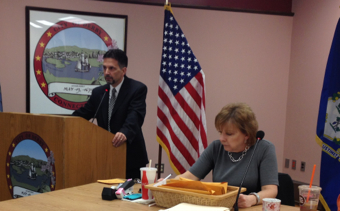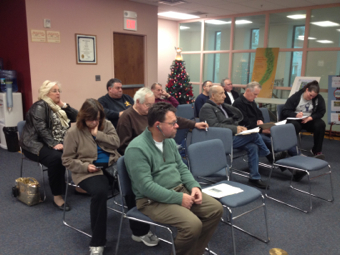 The City of Derby is due to collect nearly $200,000 after auctioning off six tax-delinquent properties Friday (Dec. 5), and has taken in nearly $1 million in back taxes in recent months from landowners who didn’t want to see their properties sold to the highest bidder.
The City of Derby is due to collect nearly $200,000 after auctioning off six tax-delinquent properties Friday (Dec. 5), and has taken in nearly $1 million in back taxes in recent months from landowners who didn’t want to see their properties sold to the highest bidder.
The owners of the six properties auctioned Friday (Dec. 5) still have six months to pay their back taxes.
If they don’t, the winning bidders from the auction will become the new owners.
Derby itself purchased two properties at Friday’s tax sale — at 31 Derby Ave. and 182 Derby Ave. — with a view to getting them back on the tax rolls as soon as possible.
Background
.
About eight months ago, Derby Tax Collector Denise Cesaroni identified a list of the 25 most tax-delinquent properties in the city to put up for auction.
About a dozen property owners paid their seriously delinquent tax bills prior to Friday, meaning their properties weren’t put up for auction.
In all, $936,696.97 in back taxes were collected leading up to the sale.
The properties sold Friday will net the city another $197,302.90, assuming all sales go through.
There is a six-month redemption period where the original owners can pay their debts and hold onto the properties.
State law gives municipalities the authority to auction off properties on which back taxes are owed.
The law also sets out a painstaking series of procedural steps cities are required to fulfill in selling the properties, because the Constitution prohibits government taking private property unless owners are given due process.
The man conducting Friday’s sale, attorney Francis Teodosio, asked the 20 or so people who showed up for Friday’s auction to keep that in mind, and not congratulate “winning” bidders.
“This is a serious matter, and this is a solemn matter,” Teodosio said.
 The Auction
The Auction
So there was none of the fast-talking “cattle rattle” auction chanting Friday from the even-keeled lawyer.
About 10 bidders filed into City Hall’s Joan Williamson Aldermanic Chambers to register beforehand — while plunking down a $5,000 deposit. They also identified which properties they were interested in.
Teodosio then went through the parcels one by one, calmly announcing increasing increments of $100, $500, or $1,000 as bidders held up paddles to represent offers.
Teodosio deliberately repeated each top bid three times before officially declaring it a winning bid.
Those properties, along with a list of the minimum bids (representing total back taxes, interest, and lien fees) and final sale prices, were:
- 46 – 48 Fifth St., minimum bid $10,968.65, sold for $28,068.65 to Susan Giordano.
- 420 Roosevelt Drive, minimum bid $32,161.40, sold for $43,061.40 to Susan Giordano.
- 46 – 50 Commerce St., minimum bid $22,698.22, sold for $22,698.22 Frank Pepe.
- 39 – 41 McLaughlin Terrace, minimum bid $40,253.57, sold for $43,053.57 to Frank Pepe.
- 6A Maplewood Condo, minimum bid $44,014.32, sold for $50,014.32 Kastroit Canka.
- 26 Bank St., minimum bid $10,406.74, sold for $10,406.74 Richard Kastens.
Four properties did not receive any bids. They were:
- 67 – 71 Minerva St., minimum bid $137,688.59
- 62 Mountain St., minimum bid $48,826.32
- 130 High St., minimum bid $54,681.16
- 9 Donna Ave., minimum bid $45,877.52
Derby’s In The Real Estate Business
In addition, the city itself, represented by Henry Domurad, Mayor Anita Dugatto’s chief administrative assistant, was the sole “bidder” on two other properties — 31 Derby Ave. and 182 Derby Ave. — for the $73,682.50 and $33,274.85.
Dugatto and Domurad wouldn’t explain why the city purchased the properties.
They referred questions about the city’s plans for the properties to the Board of Aldermen.
Alderman Carmen DiCenso, who chairs the board’s subcommittee on blight issues, said the Aldermen had identified about a half-dozen of the properties up for sale they were willing to take title to if there were no other bidders.
DiCenso said Derby will wait six months to see if the owners step forward to pay the back taxes and retain ownership of the properties.
If no one pays, the city will evaluate the buildings on the property.
“We’ll assess the properties, see if they can be resold, and if they can’t be resold, if they’re in disrepair, we’ll think about knocking them down,” DiCenso said. “And if they’re worth saving, we’ll sell them with conditions we fix. Not knowing what’s inside yet, it’s hard to say.”
The city will not have to cut itself a check to pay for the properties since Aldermen can just forgive the back taxes owed if Derby becomes owner.
DiCenso said if the city can flip the properties easily as-is, Aldermen would do so.
“If they’re only turned over because of taxes, we’ll just resell them,” he said.
Derby Treasurer Keith McLiverty has been lobbying the Board of Aldermen for years to pursue problem properties in Derby and knock them down, if the opportunity is presented. A goal should be to reduce density in Derby, which was recently listed in the top 10 most distressed cities in the state.
In 2012, the Board of Aldermen asked the city’s tax board to set aside about $200,000 for a blight “demolition” fund.
An online assessor’s database identifies 31 Derby Ave. as a commercial property.
It is owned by Derby Five Star, LLC. A state records search shows the LLC is connected to Robert J. Vontell, Jr, an Easton resident.
The Derby Board of Aldermen placed 31 Derby Ave. on the city’s blight list in April, according to meeting minutes.
Vontell also owns 46 – 48 Fifth St., a long blighted property that was sold Friday. He has been in negotiations with the Aldermen over his properties for a few years.
A search of the Electronic Valley shows 182 Derby Ave. has been on and off the city’s blight list over the years. Public records list the owner as the Blakeman family.
Blighted properties get onto the city’s blight list after numerous attempts by city officials to get property owners to address issues on a given property.
Reaction
Dugatto credited Cesaroni and Teodosio with doing the heavy lifting to bring some much-appreciated revenue to the city.
“It’s a big process and they have to cross all their t’s and dot their i’s. It’s a big undertaking,” Dugatto said.
Tax sales are a good way to “incentivize” owners of properties that have remained stagnant for years to either pay their taxes or risk losing them, the mayor said.
Cesaroni said after Friday’s auction that the tax sale had proved “very effective.”
She also noted the many properties initially identified for sale whose owners had paid up on by Friday.
“The thing that we hope to see is the property owners themselves keeping their property,” she said.